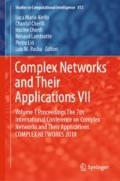Abstract
A major problem in the study of social networks is estimating the number of people an individual knows. However, there is no general method to account for barrier effects, a major source of bias in common estimation procedures. The literature describes approaches that model barrier effects, or non-random mixing, but they suffer from unstable estimates and fail to give results that agree with specialists’ knowledge. In this paper we introduce a model that builds off existing methods, imposes more structure, requires significantly fewer parameters, and yet allows for greater interpretability. We apply our model on responses gathered from a survey we designed and show that our conclusions better match what sociologists find in practice. We expect that this approach will provide more accurate estimates of personal network sizes and hence remove a significant hurtle in sociological research.
Access this chapter
Tax calculation will be finalised at checkout
Purchases are for personal use only
References
De Boor, C.: A Practical Guide to Splines, vol. 27. Springer, New York (1978)
Gelman, A., Stern, H.S., Carlin, J.B., Dunson, D.B., Vehtari, A., Rubin, D.B.: Bayesian Data Analysis. Chapman and Hall/CRC (2013)
Killworth, P.D., Johnsen, E.C., McCarty, C., Shelley, G.A., Bernard, H.R.: A social network approach to estimating seroprevalence in the United States. Soc. Netw. 20(1), 23–50 (1998)
McCarty, C., Killworth, P.D., Bernard, H.R., Johnsen, E.C., Shelley, G.A.: Comparing two methods for estimating network size. Hum. Organ. 60(1), 28–39 (2001)
McCormick, T.H., Salganik, M.J., Zheng, T.: How many people do you know? Efficiently estimating personal network size. J. Am. Stat. Assoc. 105(489), 59–70 (2010)
McPherson, M., Smith-Lovin, L., Cook, J.M.: Birds of a feather: homophily in social networks. Ann. Rev. Sociol. 27(1), 415–444 (2001)
Stan Development Team: Stan modeling language: User’s guide and reference manual (2016). Version 2.14.0. http://mc-stan.org/
Zheng, T., Salganik, M.J., Gelman, A.: How many people do you know in prison? Using overdispersion in count data to estimate social structure in networks. J. Am. Stat. Assoc. 101(474), 409–423 (2006)
Acknowledgements
This research is supported by NSF grant SES 1023176.
Author information
Authors and Affiliations
Corresponding author
Editor information
Editors and Affiliations
Rights and permissions
Copyright information
© 2019 Springer Nature Switzerland AG
About this paper
Cite this paper
Sahai, S., Jones, T., Cowan, S.K., Zheng, T. (2019). Estimating Personal Network Size with Non-random Mixing via Latent Kernels. In: Aiello, L., Cherifi, C., Cherifi, H., Lambiotte, R., Lió, P., Rocha, L. (eds) Complex Networks and Their Applications VII. COMPLEX NETWORKS 2018. Studies in Computational Intelligence, vol 812. Springer, Cham. https://doi.org/10.1007/978-3-030-05411-3_55
Download citation
DOI: https://doi.org/10.1007/978-3-030-05411-3_55
Published:
Publisher Name: Springer, Cham
Print ISBN: 978-3-030-05410-6
Online ISBN: 978-3-030-05411-3
eBook Packages: Intelligent Technologies and RoboticsIntelligent Technologies and Robotics (R0)

